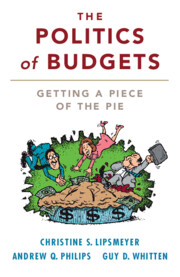Book contents
- Frontmatter
- Dedication
- Contents
- Figures
- Tables
- Acknowledgements
- 1 Introduction
- 2 A Theory of Budgets
- 3 Political Competition and the Expenditure Pie
- 4 The Effects of Elections, Economics, and International Shocks on the Expenditure Pie
- 5 Four Sides of the Budgetary Ledger
- 6 The Effects of Elections, Economics, and External Shocks on the Budgetary Ledger
- 7 Conclusion: The Budgetary Mix
- References
- Index
2 - A Theory of Budgets
Published online by Cambridge University Press: 16 March 2023
- Frontmatter
- Dedication
- Contents
- Figures
- Tables
- Acknowledgements
- 1 Introduction
- 2 A Theory of Budgets
- 3 Political Competition and the Expenditure Pie
- 4 The Effects of Elections, Economics, and International Shocks on the Expenditure Pie
- 5 Four Sides of the Budgetary Ledger
- 6 The Effects of Elections, Economics, and External Shocks on the Budgetary Ledger
- 7 Conclusion: The Budgetary Mix
- References
- Index
Summary
In Chapter 2, we begin with a discussion of the vast literature on political budgeting. We identify three main types of approaches in the extant literature – studies focusing on single budgetary categories, studies of budgetary changes, and studies of aggregate budgetary components. While each of these approaches has provided helpful insights into the relationships between politics and budgeting, they have ignored or greatly simplified the complex tradeoffs and interworkings of budgetary components. Our theoretical argument of political budgeting engages with both the compositional tradeoffs that occur across expenditure categories and the simultaneous interplay between expenditures, revenues, budgetary volatility, and deficit components of budgets. We argue that government ideology and the priorities of core supporters of governments drive their general budgetary priorities; however, domestic and international contexts can make it easier or harder for governments to implement these priorities. Focusing on the contexts of government power, electoral timing, economic conditions, globalization, and conflict affect governments’ budgetary abilities, we put forth a theoretical argument that governments may be unable to fulfil their ideological preferences when external contexts constrain their behavior.
Keywords
- Type
- Chapter
- Information
- The Politics of BudgetsGetting a Piece of the Pie, pp. 17 - 58Publisher: Cambridge University PressPrint publication year: 2023

